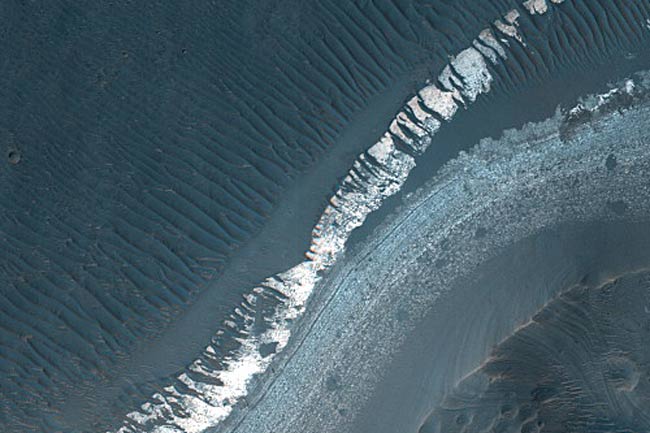Once-Habitable Lake Found on Mars

Breaking space news, the latest updates on rocket launches, skywatching events and more!
You are now subscribed
Your newsletter sign-up was successful
Want to add more newsletters?

Delivered daily
Daily Newsletter
Breaking space news, the latest updates on rocket launches, skywatching events and more!

Once a month
Watch This Space
Sign up to our monthly entertainment newsletter to keep up with all our coverage of the latest sci-fi and space movies, tv shows, games and books.

Once a week
Night Sky This Week
Discover this week's must-see night sky events, moon phases, and stunning astrophotos. Sign up for our skywatching newsletter and explore the universe with us!

Twice a month
Strange New Words
Space.com's Sci-Fi Reader's Club. Read a sci-fi short story every month and join a virtual community of fellow science fiction fans!
Alake that might once have been habitable may have filled a crater for a longtime on early Mars, new spacecraft images reveal.
NASA'sMars Reconnaissance Orbiter (MRO) captured the images that suggest thedebris-strewn Holden Crater once held a calm body of water that could haveharbored life. There is so far no convincing evidence life does or ever didexist on Mars, however.
Thecrater debris includes a mix of broken boulders and smaller particles calledmegabreccia.
"Holdencrater has some of the best-exposed lake deposits and ancient megabreccia knownon Mars," said Alfred McEwen, principal scientist for MRO's HiRISE camera."Both contain minerals that formed in the presence of water and markpotentially habitable environments. This would be an excellent place to send arover or sample-return mission to make major advances in understanding if Marssupported life."
Thatmission could be NASA's Mars Science Laboratory, set for launch next year. The Holden Crater isone of six landing sites under consideration.
TheHolden impact crater formed inside a larger impact basin that was crisscrossedby large, natural channels. Blocks as large as 164 feet (50 meters) wereblasted from the basin by the impact, before falling back to the surface toform the megabreccia layer.
Waterlater settled a layer of fine-grained sediment on top of the megabreccia,including clay that could preserve any signs of life that might have existed.
Breaking space news, the latest updates on rocket launches, skywatching events and more!
"Ifwe were looking on Earth for an environment that preserves signatures relatedto habitability, this is one of the kinds of environments we would lookat," said John Grant, Hi-RISE scientist.
Thatclay may have remained hidden except for a stroke of luck, when the Holdencrater rim crumbled under the force of nearly 960 cubic miles of water (4,000cubic kilometers) that it was holding back. The resulting flood tore up blocksthe size of football fields and left boulder-filled debris, according to Grant,but also revealed parts of the clay layer.
Thefirst long watery period at Holden Crater probably lasted thousands of years,while the second lake that formed after the crater rim was breached may havelasted just hundreds of years, Grant added.
Mostevidence for long periods of wet conditions on Mars rests in the planet'searliest history, according to HiRISE scientists. Water may have only flowedlater on during catastrophic events such as impacts on the planet surface.
- GALLERY:Ice on Mars
- VIDEO:Mars Reconnaissance Orbiter
- All About Mars
Updated at 2:00 p.m. ET
Jeremy Hsu is science writer based in New York City whose work has appeared in Scientific American, Discovery Magazine, Backchannel, Wired.com and IEEE Spectrum, among others. He joined the Space.com and Live Science teams in 2010 as a Senior Writer and is currently the Editor-in-Chief of Indicate Media. Jeremy studied history and sociology of science at the University of Pennsylvania, and earned a master's degree in journalism from the NYU Science, Health and Environmental Reporting Program. You can find Jeremy's latest project on Twitter.
